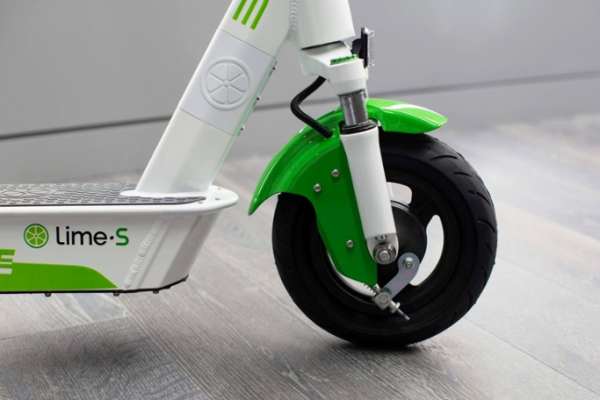Published on the 25/10/2018 | Written by Jonathan Cotton

Zero emissions, quiet and perfect for the suit-and-tie-brigade, is micro transport the future of urban transport?..
Everyone’s noticed: California-based Lime has rolled out 900 scooters across Auckland and Christchurch as part of a three month trial to see whether the GPS-enabled scooters will catch on with busy urbanites looking for new options for their daily commute. Numbers are expected to rise to around 1700 across both cities soon.
This time New Zealand isn’t first to the plate: Lime operates in over 100 locations around the world offering fleets of scooters, cycles and traditional pedal bikes. (While well-established worldwide, the roll out is the first of its kind in the Asia-Pacific region, with Brisbane, Sydney and Melbourne rollouts planned within the next few months.)
“Digitisation could also help connect bike sharing systems with traditional public transport.”
Since its launch in California last year the 500+ employee company has attracted more than US$467 million in funding from backers including Google Ventures and that other controversial transport industry disrupter, Uber.
Bike sharing systems in general have emerged around the world over the past decade, with a total fleet of shared bicycles estimated to be around 1,000,000. The Lime offering has both feet – or should that be wheels – firmly in that format: Users download the Lime app on their mobile device, letting them locate available scooters via a GPS-enabled interface. Scooters are unlocked with the app, and rides are charged at $1 plus 30 cents per minute (working out at around $18 an hour, slightly more expensive than an off-peak Uber). When the rider is done the scooter can simply be abandoned as and where is (within a certain broad geographical location), ready for the next rider. Travelling at a maximum speed of 27km/h and covering a distance of around 50km between charges, abandoned scooters are collected by ‘juicers’ each evening, who charge the devices at home overnight and distribute them, fully charged, to sensible spots – mainly residential areas – the following morning.
And there’s an appetite for the product, this week at least: The app topped the New Zealand app charts overnight following its launch.
“Locals and tourists in both cities have jumped on the micro-mobility trend, which has shot our app up 348 spots to the top of the New Zealand charts,” enthuses New Zealand ‘Lime Launcher’ Hank Rowe.
“Through our work with local authorities it became clear to us that New Zealanders have been seeking more accessible, cheaper and greener transportation options.”
There have been rumblings amongst Juicers too with low rates (around $7-8 per pick-up – charge – drop off) assuming a 100 percent charge and drop off before 7am. If the app doesn’t agree on the charge (which has been reported as a common issue) or the drop-off is late, the Juicer is hit with a 50 percent penalty.
Like Uber, as Lime launches in new markets they seem to be greeted with equal measures of enthusiasm and trepidation: The NZ Transport Agency initially expressed doubts about the suitability of the scooters for use in cycle lanes, but have since changed their tune with the scooters currently street, footpath, walking path and cycleway-legal. (With a 300 Watt motor the scooters are classed as recreational vehicles and therefore a helmet is not required.)
There’s more hand-wringing of course. ACC has confirmed that several claims have been lodged, averaging ‘less than four a day’. But this time the negative Nellies may have a point. Lime, along with established competitor company Bird, both leave a trail of litigation in their wake, and both have been named in a class action lawsuit in the United States arising from several accidents resulting in injuries. Both companies have displayed ‘a wanton disregard for the safety of others’ the lawsuit reads.
“While acting under the guise of the commendable goals of furthering personal freedom and mobility and protecting the environment, the defendants, and each of them, are endangering the health, safety and welfare of riders, pedestrians and the general public,” the suit alleges.
Other concerns include abandoned scooters creating obstructions in busy areas and an excessive (to some) top speed of nearly 30kph.
But Lime is undeterred. The company – currently valued at more than US$1 billion – has announced that in the coming year it will be opening brick and mortar storefronts around the world, renting and charging scooters in-house and promoting ‘community engagement, rider education and brand experience’.
The industry in general is only set to accelerate: With around 600 total operators worldwide, it’s expected to grow at a rate of about 20 percent per year to a US$5.8B market by 2020.
“Three factors are driving the bike sharing boom,” say researchers at consultancy firm Roland Berger.
“First of all, digitisation is making the cycling experience more attractive than ever…On a larger scale, digitisation could also help connect bike sharing systems with traditional public transport.
“E-bikes, although still less visible in the market, offer a less physically demanding riding experience and are opening up the market to a broader range of users. If planned bike sharing tax deductions are introduced, the market could receive another big boost.”



























